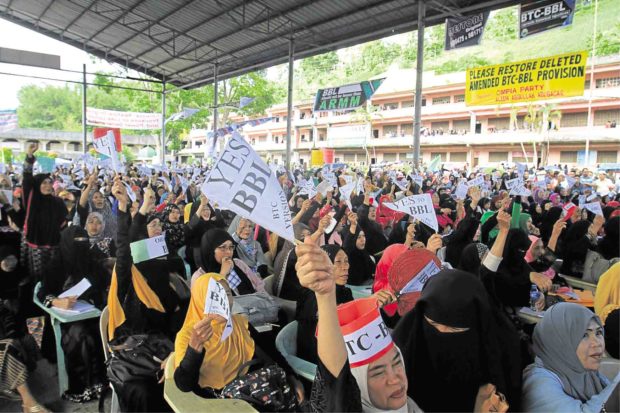Stop Bangsamoro law, group asks Supreme Court

BANGSAMORO VOICE Thousands of Muslims from the two Lanao provinces express their support for the Bangsamoro Organic Law during a rally in Marawi City in July. —RICHEL V. UMEL
With just a month to go before the plebiscite to ratify the Bangsamoro Organic Law (BOL), a group of constitutionalists has asked the Supreme Court to strike down as unconstitutional the charter of a proposed new autonomous region for Muslims in Mindanao.
“The BARMM (Bangsamoro Autonomous Region in Muslim Mindanao) was created by Congress in violation of the Constitution,” the Philippine Constitutional Association (Philconsa) said in a petition filed on Dec. 11.
The group asked the Supreme Court to issue a temporary restraining order to stop Malacañang and Congress from enforcing the law that would establish the BARMM to replace the 28-year-old Autonomous Region in Muslim Mindanao (ARMM).
No comment
Malacañang on Tuesday declined to comment.
Article continues after this advertisement“We will not make any comment on that because it is now pending before the court,” presidential spokesperson Salvador Panelo told reporters.
Article continues after this advertisementThere was no immediate comment from the Moro Islamic Liberation Front, the largest insurgent group in Mindanao that signed a peace agreement with the government in March 2014.
The peace accord included the establishment of a new, expanded autonomous region for Muslims in resource-rich but war-torn Mindanao.
Philconsa, whose members include framers of the 1987 Constitution, invoked Article X, Sections 18 and 19, of the Charter, which authorized the first Congress to be elected under it to pass organic acts for autonomous regions in Muslim Mindanao and Cordillera.
Only two regions
“It is indubitable that the ARMM and the Cordillera (Autonomous Region) were created by the Constitution. They are the only autonomous regions recognized by the Constitution. The BARMM was created by Congress in violation of the Constitution,” Philconsa said.
The group interpreted Article X to mean that amending the Constitution “is the only way to create a new and distinct autonomous region such as the BARMM, or to abolish an existing autonomous region such as the ARMM.”
“Congress is prohibited or has no authority to create other autonomous regions,” Philconsa said.
The Commission on Elections has scheduled the plebiscite to ratify the BOL for Jan. 21 and Feb. 6 next year.
The proposed BARMM would be an expansion of the current ARMM territory, which encompasses the provinces of Maguindanao, Lanao del Sur, Basilan, Sulu and Tawi-Tawi and the cities of Marawi and Lamitan.
Under the BOL, all areas within the ARMM would become parts of the BARMM, while Cotabato City, Isabela City and the towns of Aleosan, Carmen, Kabacan, Midsayap, Pikit and Pigkawayan in Lanao del Norte, and 39 villages in North Cotabato may vote to join the new Muslim autonomous region.
Second challenge
The Philconsa petition is the second challenge to the BOL to be brought to the Supreme Court.
Sulu Gov. Abdusakur Tan II filed the first challenge in October on behalf of his province, questioning the legality of the BOL. —With a report from Julie M. Aurelio